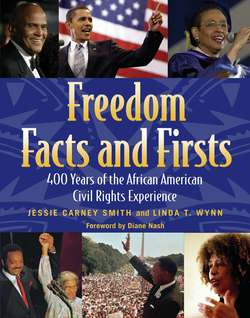Читать книгу Freedom Facts and Firsts - Jessie Carney Smith - Страница 24
На сайте Литреса книга снята с продажи.
Music Music of the Civil Rights Movement
ОглавлениеAfrican American music has been important to the lifestyle and survival of black people. Music is one of the most prominent areas of African retention in African American culture. Like the West African traditional role of art, music for African Americans during slavery served not only as an expression of morality and cultural values but also as a means of communicating social and political views. During slavery, spirituals and work songs provided affirmation and strength in the face of a system meant to debilitate and degrade. From the spirituals and work songs to the later forms of blues, jazz, R&B, and gospel, African American music from the time of slavery to the climax of the Civil Rights Movement in the 1950s and 1960s has inspired protest and progress.
During the 1950s and 1960s, a number of songs served to empower civil rights demonstrators. Some of these songs were performed by the Freedom Singers of Albany, Georgia, to raise money for protesters and the Student Non-Violent Coordinating Committee. The same songs performed and later recorded by the Freedom Singers were sung at marches and rallies to inspire protesters, giving them a common orientation and sense of purpose and direction. Prominent among the singers were Cordell Reagon and Bernice Johnson Reagon. According to Eilene Southern, “We Shall Overcome” was the theme song of the movement in its early days. Martin Luther King Jr. and other leaders of the movement commonly referred to that freedom song as a spiritual, probably because it resembled the nineteenth-century slave song “No More Auction Block for Me.” Among other prominent songs of protest were “I Shall Not Be Moved,” “Oh, Freedom,” “Keep Your Eyes on the Prize,” and “This Little Light of Mine.”
The religious nature of some songs was modified at times to indicate a political agenda; the religious origin of the music, however, underscored the moral mission of the Civil Rights Movement. The music expresses the idea that the racial oppression and injustice visited upon African Americans was not only unfair but immoral, emphasizing the concept that their political mission was a spiritual one as well. Secular music also served to inspire change and encourage civil rights protesters. The dominance of Berry Gordy’s black record label Motown and the ability of African American artists to win reputations in mainstream America suggest the determination of the Civil Rights Movement.
Singer, songwriter, and pianist Nina Simone, who was passionately committed to the Civil Rights and Black Power Movements, is said to have given musical expression to both. She contributed her talent to the movements by singing at benefits and marches. Her song “Mississippi Goddam” became a classic during the Civil Rights Movement. Sam Cooke’s “A Change Gonna Come” and James Brown’s song “I’m Black and I’m Proud” were two of the most well-known popular songs to inspire and serve the Civil Rights Movement. Some other R&B artists who contributed inspiring messages to the movement include Curtis Mayfield and the Impressions, Marvin Gaye, and Martha Reeves and the Vandellas. The songs of the movement are variously recorded; a notable source is the Smithsonian Institution’s three-volume collection released in 1980, Voices of the Civil Rights Movement: Black American Freedom Songs 1960–66.
Rebecca S. Dixon
